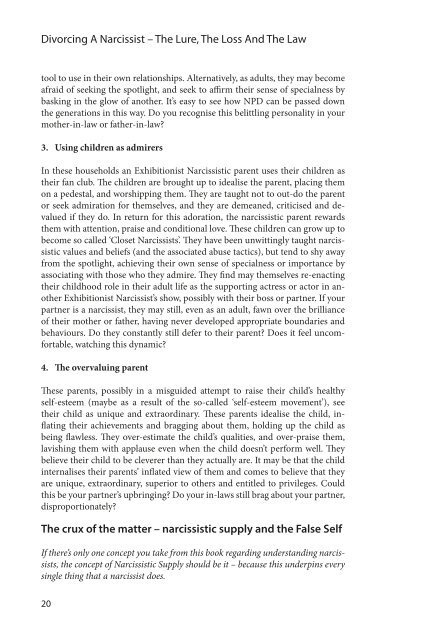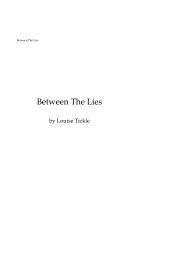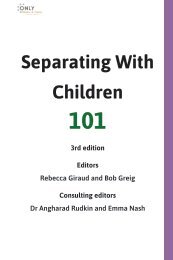Divorcing a narcissist: read the contents plus chapter 1
Separating or divorcing a narcissist or someone who has narcissistic traits can be a difficult, draining experience. This book is written for the spouse of such a personality, to support them step by step through the legal process, as well as through the difficult emotional journey that they'll be undertaking. It will help you recognise narcissistic behaviour, prime you on what challenges lie ahead and provide practical insights on how to survive the process. It will also help you work with your lawyer so you can both understand the potential pitfalls that could frustrate attempts to finalise your separation. The book is a companion volume to our book for lawyers, Narcissism and Family Law: A Practitioner's Guide
Separating or divorcing a narcissist or someone who has narcissistic traits can be a difficult, draining experience.
This book is written for the spouse of such a personality, to support them step by step through the legal process, as well as through the difficult emotional journey that they'll be undertaking. It will help you recognise narcissistic behaviour, prime you on what challenges lie ahead and provide practical insights on how to survive the process.
It will also help you work with your lawyer so you can both understand the potential pitfalls that could frustrate attempts to finalise your separation.
The book is a companion volume to our book for lawyers, Narcissism and Family Law: A Practitioner's Guide
You also want an ePaper? Increase the reach of your titles
YUMPU automatically turns print PDFs into web optimized ePapers that Google loves.
<strong>Divorcing</strong> A Narcissist – The Lure, The Loss And The Law<br />
tool to use in <strong>the</strong>ir own relationships. Alternatively, as adults, <strong>the</strong>y may become<br />
afraid of seeking <strong>the</strong> spotlight, and seek to affirm <strong>the</strong>ir sense of specialness by<br />
basking in <strong>the</strong> glow of ano<strong>the</strong>r. It’s easy to see how NPD can be passed down<br />
<strong>the</strong> generations in this way. Do you recognise this belittling personality in your<br />
mo<strong>the</strong>r-in-law or fa<strong>the</strong>r-in-law?<br />
3. Using children as admirers<br />
In <strong>the</strong>se households an Exhibitionist Narcissistic parent uses <strong>the</strong>ir children as<br />
<strong>the</strong>ir fan club. The children are brought up to idealise <strong>the</strong> parent, placing <strong>the</strong>m<br />
on a pedestal, and worshipping <strong>the</strong>m. They are taught not to out-do <strong>the</strong> parent<br />
or seek admiration for <strong>the</strong>mselves, and <strong>the</strong>y are demeaned, criticised and devalued<br />
if <strong>the</strong>y do. In return for this adoration, <strong>the</strong> <strong>narcissist</strong>ic parent rewards<br />
<strong>the</strong>m with attention, praise and conditional love. These children can grow up to<br />
become so called ‘Closet Narcissists’. They have been unwittingly taught <strong>narcissist</strong>ic<br />
values and beliefs (and <strong>the</strong> associated abuse tactics), but tend to shy away<br />
from <strong>the</strong> spotlight, achieving <strong>the</strong>ir own sense of specialness or importance by<br />
associating with those who <strong>the</strong>y admire. They find may <strong>the</strong>mselves re-enacting<br />
<strong>the</strong>ir childhood role in <strong>the</strong>ir adult life as <strong>the</strong> supporting actress or actor in ano<strong>the</strong>r<br />
Exhibitionist Narcissist’s show, possibly with <strong>the</strong>ir boss or partner. If your<br />
partner is a <strong>narcissist</strong>, <strong>the</strong>y may still, even as an adult, fawn over <strong>the</strong> brilliance<br />
of <strong>the</strong>ir mo<strong>the</strong>r or fa<strong>the</strong>r, having never developed appropriate boundaries and<br />
behaviours. Do <strong>the</strong>y constantly still defer to <strong>the</strong>ir parent? Does it feel uncomfortable,<br />
watching this dynamic?<br />
4. The overvaluing parent<br />
These parents, possibly in a misguided attempt to raise <strong>the</strong>ir child’s healthy<br />
self-esteem (maybe as a result of <strong>the</strong> so-called ‘self-esteem movement’), see<br />
<strong>the</strong>ir child as unique and extraordinary. These parents idealise <strong>the</strong> child, inflating<br />
<strong>the</strong>ir achievements and bragging about <strong>the</strong>m, holding up <strong>the</strong> child as<br />
being flawless. They over-estimate <strong>the</strong> child’s qualities, and over-praise <strong>the</strong>m,<br />
lavishing <strong>the</strong>m with applause even when <strong>the</strong> child doesn’t perform well. They<br />
believe <strong>the</strong>ir child to be cleverer than <strong>the</strong>y actually are. It may be that <strong>the</strong> child<br />
internalises <strong>the</strong>ir parents’ inflated view of <strong>the</strong>m and comes to believe that <strong>the</strong>y<br />
are unique, extraordinary, superior to o<strong>the</strong>rs and entitled to privileges. Could<br />
this be your partner’s upbringing? Do your in-laws still brag about your partner,<br />
disproportionately?<br />
The crux of <strong>the</strong> matter – <strong>narcissist</strong>ic supply and <strong>the</strong> False Self<br />
If <strong>the</strong>re’s only one concept you take from this book regarding understanding <strong>narcissist</strong>s,<br />
<strong>the</strong> concept of Narcissistic Supply should be it – because this underpins every<br />
single thing that a <strong>narcissist</strong> does.<br />
20













